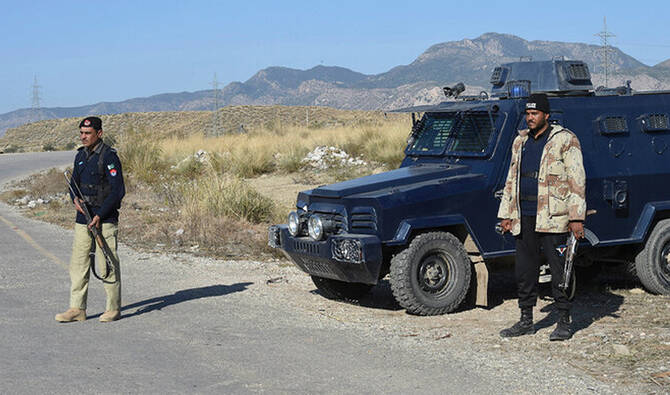KARACHI: More than a dozen decrepit dogs splash into the Arabian Sea as the small wooden boat approaches. They know the fishermen’s mission: bringing food and water for the canine population of one of Karachi’s “dog islands.”
The boat, powered by an old jeep engine, stops when the water is still waist-high, two fishermen jumping from it to wade ashore the low, barren, waste-covered beach, whose only inhabitants are barking their welcome.
The island, known as Dingy or Buddo, is one of dozens populated by dogs that line the shore south of the sprawling port megacity.
Conservative figures estimate the feral dog population of Karachi could number up to 35,000.
With animal rights at their nadir and religious sentiment in the Muslim country partly to blame for a prejudice against dogs, the figures spark a brutal culling each year that sees bodies pile up in the streets, rotting in the sweltering heat as they wait to be bulldozed away.
The islands, despite their lack of food and fresh water, have become a sanctuary, an alternative where estimates suggest hundreds of dogs avoid the cull.
But their survival depends almost entirely on the supplies brought to them by Karachi’s fishermen as they trawl the coast.
“We see them standing at the shore of the island in hope of food from us. So we feel their silent call,” says Abdul Aziz, a 30-year-old fisherman, after feeding the dogs on Dingy Island some pancakes and water left over from their own supplies.
It is not known for sure who first brought dogs to the islands, but fishermen believe they were transported by villagers along the coastal areas seeking to save them from the cull.
Sometimes they scavenge dead fish that float ashore, or smaller animals on the outcrops. In desperation, they have been known to turn on each other for survival, the fishermen say.
With no fresh water source, compelled by thirst, they have also been known to drink the brackish water that forms in pools along the island shores, underscoring the urgency of the fishermen’s mission.
On Dingy Island, the dogs leap around Aziz and his colleague Mohammad Dada, standing on their hind legs and pawing at the pair in the scramble for food and water.
Puppies are overrun by the larger dogs. But the kind fishermen make sure even the smallest get a share.
“A human being is nothing without humanity,” Aziz says, looking at the island, where plastic bags and a syringe lie among the hungry creatures.
“When we feel the pinch of hunger and thirst, they also must be feeling it.”
Isle of dogs: Pakistan fishermen feed islands full of strays
Isle of dogs: Pakistan fishermen feed islands full of strays

Pakistan police say 27 cops killed in 134 attacks in restive Bannu district in 2025

- Bannu is a restive district in northwestern Pakistan where militants frequently attack law enforcers
- Police say at least 20 drone attacks by militants killed nine civilians, injured 19 cops during the year
PESHAWAR: Police in Pakistan’s northwestern Bannu district said this week that at least 27 police personnel were killed in 134 attacks while 53 militants were killed during various security operations in the volatile area during the year, as Islamabad grapples with a surge in militancy.
Bannu district in Khyber Pakhtunkhwa (KP) province is one of Pakistan’s most dangerous districts, where militants affiliated with the Tehreek-e-Taliban Pakistan (TTP) frequently target law enforcers in attacks.
Regional Police Officer Sajjad Khan told reporters during a press briefing on Wednesday that at least 134 “terrorist attacks” were recorded in Bannu district during 2025 that targeted police stations, posts, checkpoints, police mobiles and police parties.
“As a result of these attacks, 27 police personnel were martyred and 79 were injured,” a statement issued by Bannu Police said on Wednesday.
It said at least 168 intelligence-based operations were conducted by police across the district during the year, in which 105 militants were arrested and 65 were killed.
Khan informed media that militants carried out 20 drone attacks targeting police installations and civilian areas in 2025, killing nine civilians and injuring 19 police personnel.
“However, following the installation of an anti-drone system in Bannu district on Jul. 18, 2025, the situation improved significantly,” the statement said. “More than 300 drone attacks were thwarted, and four drones were struck/spoofed.”
He said the Bannu police force has been equipped with drones, anti-drone guns, sniper rifles, armored personnel carriers (APCs), thermal imaging systems, tactical helmets and bulletproof vehicles.
“Bannu police reiterates its resolve to continue its struggle to maintain law and order in the district, completely eliminate terrorism and protect the lives and property of the public,” the statement concluded.
Pakistan blames the Afghan government for facilitating TTP attacks inside its territory, a charge Kabul denies. The surge in militant attacks has strained ties between Pakistan and Afghanistan, leading to deadly border clashes in October that saw dozens killed and several wounded on both sides.











